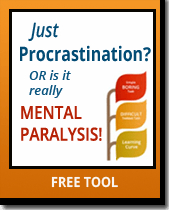Unloading the Procrastination Gun
By Wade M. Nye BS, M.Div, ADD Coach/Counselor
Under the Gun. ADD experts agree that all ADD'ers have one thing in common: we avoid boring jobs at all costs. All my life I steered clear of unexciting tasks as best I could. My strategy was to convince myself that I did my best work under the gun, and then put off those routine tasks off till the last minute. But living all my life with the procrastination gun to my head caused me big time headaches and heartaches.
My term for ADD procrastination is back loading, which is the chronic affinity to postpone unpleasant tasks. Now, I've been told that everyone procrastinates, but for ADD individuals like myself, it is chronic and disruptive. It has cost me grades, jobs and unpleasant problems with institutions such as the IRS.
In high school, college and grad school, my teachers could count on me. They could count on me to rush into their office and hand my paper in at the last hour or after its due date. At work, if there was a project assigned which I viewed as mind numbing, supervisors could count on me–to hand it in after the deadline. Usually the work was accompanied by an elaborate excuse. And making up and delivering those clever excuses was no fun either, believe me.
Being undiagnosed, I viewed my procrastination as laziness. But in my experience with ADD persons, I have found few who were genuinely lazy. Now I understand that putting off tedious jobs is simply doing what ADD'ers do. We naturally and instinctively compensate for our under stimulated brains by avoiding and putting off humdrum jobs.
At a recent ADD conference, Thom Hartmann explained it this way: according to recent brain research, the sensory receptors in the thalamus region of the ADD brain record stimuli at a relatively low threshold. This means our brains don't register stimuli at as high a level as others. The volume is turned down low, is how Hartmann explained it. Therefore, ADD'ers have a need to raise the intensity level by avoiding low stimulus activities and looking for high stimulus ones. He calls this “the feeling alive quotient.” We just don't feel as alive when we are faced with low stimulation, so we have low tolerance for what we feel is boring. Experience with hundreds of ADD individuals bears out the fact that this boredom is acutely stressful and even excruciating.
All of this makes huge sense to me and explains my entire life.
But the condition known as ADD should always be an explanation, never an excuse. To survive in a non-ADD world, I must oblige the needs of this world, while still accommodating my under stimulated brain. Is this possible? Thankfully, yes. Now that I am convinced that back loading doesn't work, I utilize an ADD-friendly strategy I call front loading. Front loading is tackling a responsibility at the beginning of the time allotted.
The first step for an ADD person to begin this journey of recovery from acute and chronic procrastination, one must be totally convinced that front loading is good and back loading is bad. To help encourage you in this, consider the following.
Back Loading is bad for me because:
- When I procrastinate I might never get that job done. As Denise, a member of our support group says, “I'm a pro at back loading! It gets pushed back, and back, and back, until it's not there anymore. It simply disappears into that ADD black hole.
- When I wait till the last minute, people view me as irresponsible, lazy and believe I don't care. These people have been my teachers, parents, bosses, children and spouses. When I chronically back load, I not only let them down, I victimize myself.
- When I crowd a lot of work it into a short period of time near the deadline, I put harmful stress on my body, mind and spirit. It's an exhausting way to live. Soon after I lost yet another job because of inadequate attention to paper work and routines, I was diagnosed as having Attention Deficit Disorder. A month later I was diagnosed with coronary heart disease and had quintuple by-pass surgery. And what is a prime cause of this disease? Stress. I have no doubt that living under the procrastination gun all my life contributed to my coronary problem.
- When I postpone my responsibilities, I create that awful nagging feeling familiar to all procrastinators. The word is dread. Another member of our group describes this procrastinator's dread as following. “I have a small letter in my inbox that only weighs 6 ounces. I know that I need to pick it up and open it, but I can't bring myself to do it. That letter's weight increases everyday, and seems to weigh a ton now. I'm surprised my desk can hold it.” Is there an ADD person alive who can't relate to this? When we put ourselves under this dreaded gun, we not only create big headaches, we rob ourselves of enjoying even our most pleasant activities.
- When I wait to do an assignment at the eleventh hour, I rarely have the time to do it well and am likely to make careless mistakes. I could wall paper a room with evaluations and feed back received from teachers and supervisors, all summed up in two words: careless mistakes.
- Procrastination lowers my self-esteem.
But I can hear some of you strongly opposing this argument: “Actually, I do my best work when I'm under the gun. My brain just seems to work better,” you say. While this may be true for some, consider the following experiment conducted by one of my more creative clients.
Caitlin was away at boarding school, wondering how she might improve her grades, which were badly sagging. Normally she did not crack a book or study a note before a big test until the night before, then crammed madly. Typical ADD back loading. This method was not getting good results, however, so she tried something very drastic. Everyday, a week before a big exam, she studied for fifteen minutes. No cramming. “I got 98 per cent, the highest score I've ever got on any test,” she told me.
Now Caitlin is the first to admit, that despite this success, she doesn't regularly front-load. But hey, whatever we do is worth doing poorly, isn't it? In other words, it's better to try a new method and do it poorly, than not try at all. So I dare you students reading this to try Caitlin's experiment.
But there are many other advantages for front loading.
Front loading is good for me because:
- When I spread an assignment out over a period of time, I greatly reduce harmful stress on my body.
- When I begin a job at the outset, I can fully enjoy my pleasant activities, knowing I'm on track to finish it on schedule.
- I position myself not only to start the task, but finish it and do it well.
- I have time to review the work and avoid those nasty, careless mistakes.
- Doing it raises my self-esteem. It's wonderful to be able to look people in the eyes and not feel inferior because of procrastination.
We can be ADD winners when we make up our mind to develop the skill of front loading.
Here's how it works: Today I'm off work, so my wife leaves me a list of four routine household chores. Understanding my attention problem, she writes them down and posts them where I won't miss them, on the refrigerator. Normally I wait until just before she comes home and hurry to get them done. Or, I might just forget them altogether. Back loading. This does not lead to domestic harmony. So, instead, I front load. I get one task out of the way, first thing. I call this the power of now, in contrast to the folly of later. It means getting a job started as soon it is assigned and fresh in my mind. So, after I finish that first chore, I reward myself by doing something I enjoy. Then I do another chore and so on, till those boring jobs are out of the way. It feels so good.
In summary, front loading certainly doesn't mean that we have to complete things at the beginning of an assigned task. That is unrealistic and ADD unfriendly. It does mean we tackle the task at the outset and, like Caitlin's experiment, do a piece at a time until the deadline.
And, finally, when I front load, it feels so good, because I have unloaded that dreaded procrastination gun pointed at my head.
Copyright © Wade M. Nye, 2005. All rights reserved.
In the Blog

Manage your ADHD to get your work done Having ADHD doesn’t mean that you can’t hold a job or do your job well. Most adults with ADHD can succeed in their careers because they know how to manage their condition at work. The following tips can help you get through the workday with minimal stress, Read post.

ADHD and Mind-Mapping: Best Technique for Planning
Capture your thoughts visually to plan your project With ADHD, you’re full of ideas. But your plans just continue to swirl around in your head without turning into action. If you don’t capture your thoughts in a way you can act upon, too many ideas can just become an overwhelming distraction that keep you stuck. Read post.

How to change your words and banish ADHD shame What you say defines you. Not just to others, but to yourself. When guilt, embarrassment, or ‘not enoughness’ of ADHD slip into your conversation, you transmit insecurity and shame. Worse, you reinforce that message to yourself. But if you pause just long enough to reconsider and Read post.
